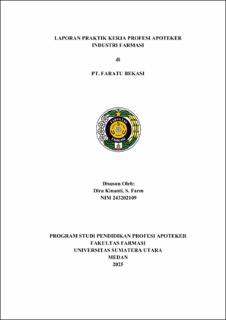Laporan Praktik Kerja Profesi Apoteker Industri Farmasi di PT. Faratu Bekasi
Professional Pharmacist Internship Report in The Pharmaceutical Industry at PT. Faratu Bekasi

Date
2025Author
Kinanti, Dira
Advisor(s)
Silalahi, Jansen
Anastasya, Prisca
Metadata
Show full item recordAbstract
Background: The pharmaceutical industry was a business entity authorized by the Minister of Health to carry out the manufacturing of drugs or pharmaceutical ingredients. Pharmaceutical preparations were required to be safe, effective, of high quality, and affordable. To ensure the safety, efficacy, and quality of drugs consumed by the public, it was necessary to establish guidelines for Good Manufacturing Practices (GMP). GMP referred to the methods and processes used in the production of drugs and/or pharmaceutical ingredients to ensure that the resulting products met the established quality standards and were suitable for their intended use.
Objective: Professional pharmacist internship conducted at PT. Faratu aimed to enhance the understanding of prospective pharmacists regarding the roles, functions, positions, and responsibilities of pharmacists within the pharmaceutical industry. The program also intended to equip students with insights, knowledge, skills, and hands-on experience necessary to perform pharmaceutical duties in an industrial setting, as well as to provide opportunities to study the principles of GMP and their implementation within the pharmaceutical manufacturing process.
Summary: Professional pharmacist internship activities at PT. Faratu encompassed observing and understanding the production process from raw materials to finished products, ensuring compliance with batch records, preparing deviation reports, and studying aspects such as Overall Equipment Effectiveness (OEE), Overall Line Effectiveness (OLE), Critical Process Parameter (CPP), serialization, and line clearance procedures.
Conclusion: Based on the professional pharmacist internship experience at PT. Faratu, it was concluded that the roles and responsibilities of pharmacists in the pharmaceutical industry were broad and multifaceted, as outlined in the personnel requirements of GMP. This was reflected through the comprehensive induction and guidance provided by departmental mentors throughout the internship. The PKPA activities at PT. Faratu successfully provided prospective pharmacists with critical thinking skills, technical competencies, creativity, and practical experience in pharmaceutical operations. Furthermore, the program offered a valuable opportunity to gain a deeper understanding of GMP principles—both in theory, through Standard Operating Procedures (SOPs), and in practice, through real-world applications in the manufacturing environment.
